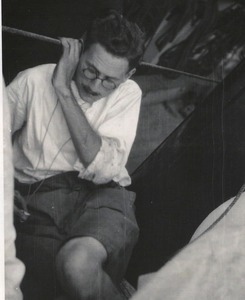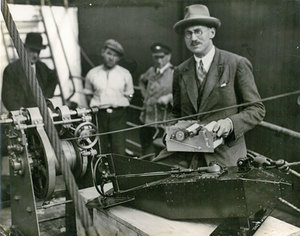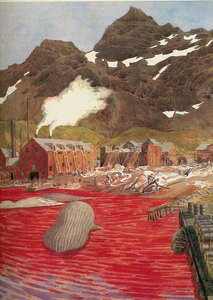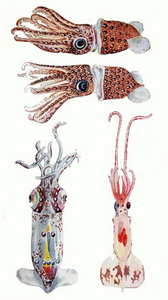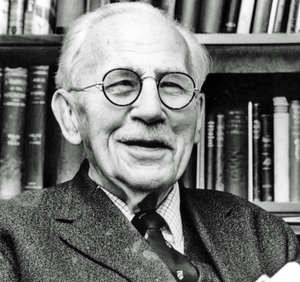HARDY, Sir ALISTER CLAVERING
1896 - 1985 from England
biologist, was born in Nottingham on 10 February 1896, the youngest of the three sons of Richard Hardy, architect and his wife Elizabeth Hannah Clavering.
After school at Oundle, he went to Exeter College Oxford in 1914. He married Silvia Lucy Garstang, the second daughter of Walter Garstang, professor of Zoology at Leeds. They had two children Michael and Belinda. Hardy's studies in Oxford were interrupted by war service, firstly in the northern cyclist battalion and later as a camouflage officer.
In 1919 he returned to Oxford to read zoology and in 1921 he became an assistant naturalist at the Fisheries Laboratory, Lowestoft, researching the feeding of North Sea herrings on plankton.
After applying to the Discovery Committee for the post of director of science he was appointed senior ship zoologist, in early 1924. He spent the summer preparing in the London office and sailed south on the Discovery with Stanley KEMP as Director and Rolfe GUNTHER as his junior.
Throughout their voyage he worked at developing a plankton recorder, which after further development is now a standard piece of equipment. In and out of South Georgia from 20 February until 17 April 1926, he was engaged in trawling along lines at different depths to investigate what plankton, including krill, they could find and attempting to relate their finds to whaling areas. On land he greatly enjoyed walking and collecting specimens of anything he saw, but spent much time stopping for research.
He visited the Falklands from 24 April to 20 May and while there Captain ROBERTS lent the gunboat Afterglow to take the biologists to investigate fauna growing on the side of the SS Great Britain. On returning to South Georgia after wintering in South Africa he transferred to the William Scoresby, the Discovery Committee's second ship, and immediately began a series of trawling surveys on lines at right angles to the coast.
In early February 1927 he sailed on Discovery to the South Orkneys and South Shetlands before returning to Stanley, transferring to the Scoresby and sailing by an indirect route back to Falmouth the following September. This expedition laid the foundation for all Hardy's future work and in January 1928 he was appointed the first professor of zoology at the new University College, Hull. The intervening months were spent planning the new department while working for the Committee so it was not until Volume XI of the Discovery Reports in 1936 that the hard work done on the Discovery was published. After Stanley Kemp's death he served on the Discovery Scientific Sub-Committee from December 1945 - March 1949.
Hardy became Regius Professor of natural history at Aberdeen in 1942 and rapidly moved on to Oxford as Linacre Professor of zoology from 1945-1961, continuing as professor of field studies until 1963.
Hardy was a man with great biological curiosity and many ideas who delighted in thinking up hypotheses and hoping that science would prove them correct. Seeing Gunther up a mast finding insects 'flying past' many miles from shore, he considered aerial plankton and in 1960 one of his talks gave rise to the aquatic ape theory.
In 1969 he founded and became director of a Religious Experience Research Centre now based in Lampeter College, Wales.
His many interests included flying, ballooning, walking, cycling and painting water colours. He wrote easily. Eighty publications written either in his own name or jointly with others covered plankton, fish, aerial drift of insects, ballooning and in later life much on the possible relationship between natural history and religion.
Great Waters (Collins 1967) is a description and update of the work done in 1925-27. His honours included a DSc from Oxford in 1938, later receiving honorary degrees from Southampton, Hull and Aberdeen. He was elected FRS in 1940 and awarded a knighthood in 1957.
Hardy died after a stroke on 23 May 1985.
See: Image 1075
Editorial comment:
Hardy was fascinated by God, the ways in which religions evolve, and the role religion has played in human evolution and survival. After retiring from Oxford, he lectured and authored books such as The Living Stream and The Divine Flame on these themes.
In 1969, at age 73, he founded the Religious Experience Research Centre in Oxford to accumulate and organize a database of spiritual experiences reported by people. He was awarded the 1985 Templeton Prize for this work. In his acceptance speech when receiving the prize, Hardy said:
I came to know what I have always regarded as God when quite a boy; it was not the result of church services, of school chapel or of scripture lessons, but for quite other reasons, as I shall explain. First, however, let me say that I have no wish in any way to denigrate the glories of our beautiful old churches with their sense of what Rudolf Otto called the numinous — the feeling of the Holy which may be so powerful in the little side chapels devoted to private prayer. My objection to the modern church is its medieval theology, so different from that of the early Christians. I came to feel the experience of God through the beauty and joys of nature.
Hardy was baptized as an Anglican and he remained one at heart. In later life, his mind drew him to become a member of the Unitarian Church.
“I feel that religion is something very deep in man’s nature. There’s nothing equaling it in emotion except sex… I think it has a biological significance, a survival value in the original tribes that had it.” Desert Island Discs, BBC Radio, October 29, 1973
External links
See: Sir Alister Hardy Foundation for Ocean Sciences - continious plankton recorder (YouTube video)
References
Alister Hardy; The Open Sea. Its Natural History (Part I) The World of Plankton. New Naturalist #34, Collins, 1956.
Alister Hardy; The Open Sea. Its Natural History (Part II) Fish & Fisheries. New Naturalist #37, Collins, 1959.
Alister Hardy; The Spiritual Nature of Man: Study of Contemporary Religious Experience. Oxford University Press, 1979
Alister Hardy; Great Waters; Collins; 1967
Comments
Revisions
May 2019 Second photograph added
August 2019 External link added
November 2019; Two additional photographs added; four references added; two additional external; links added
September 2020 One additional internal link added
July 2021 One additional photograph added; an editorial comment added; two external links added
